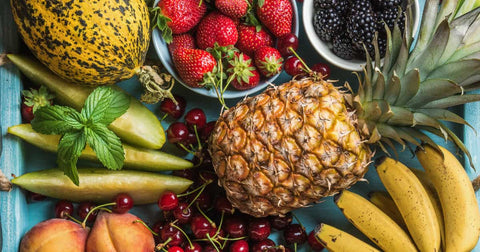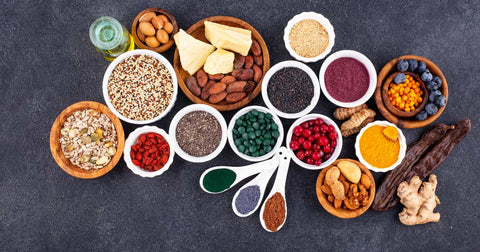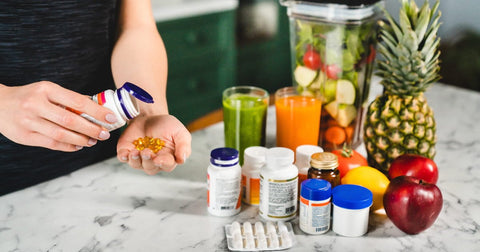Testosterone. The hormone that plays a key role in men's muscle mass, libido, and overall vitality. While diet isn't a magic bullet for sky-high testosterone, certain fruits can support the processes involved in its production and balance.
1. Pomegranates: Antioxidant All-Star

-
Punicalagins: The Special Sauce
- Punicalagins are unique to pomegranates, boasting antioxidant and anti-inflammatory properties significantly higher than other well-known antioxidant sources like blueberries or green tea.
- Chronic inflammation disrupts hormonal balance. Punicalagins help combat this, creating a healthier environment for testosterone production.
-
Nitrates: The Circulation Boost
- Pomegranates contain natural nitrates, which your body can convert into nitric oxide.
- Nitric oxide helps relax blood vessels, potentially improving blood flow for overall benefit, including sexual function.
2. Bananas: The Indirect Supporter

-
Mythbusting: "Bananas Kill Testosterone"
- This likely stems from the small amount of bromelain in bananas, and an unproven theory that it might have some testosterone-suppressing effects in massive amounts.
- The trace amounts of bromelain in a banana are insignificant in terms of impacting hormones. Bananas are a nutritious food
-
B-Vitamin Boost:
- Multiple B vitamins (found in bananas) are crucial for converting food into usable energy, and metabolic processes in general.
- When your body has the energy it needs to function optimally, this includes supporting healthy testosterone production.
-
Bromelain Basics:
- Bromelain, found in higher concentrations in pineapple stems, but also modestly in bananas, has some anti-inflammatory properties.
- Chronic inflammation disrupts many bodily systems, including hormone production. Bromelain might indirectly improve the body's environment for optimal testosterone function.
3. Grapes (especially red): Resveratrol Reservoir

-
Resveratrol
- While linked to red wine, resveratrol occurs naturally in the skins of grapes (red varieties tend to have more), peanuts, and a few other plants.
- Resveratrol belongs to a class of antioxidants known for their anti-inflammatory effects and potential to influence cellular processes.
- Numerous studies, both animal and human, are exploring its possible benefits, including its impact on testosterone.
-
Impact on Testosterone
- Some studies indicate resveratrol intake may have a positive impact on testosterone levels, especially in those compromised by health conditions or age-related decline.
- Studies also suggest resveratrol might offer protective effects on sperm health and quality, potentially improving fertility parameters.
4. Berries: Inflammation Fighters

-
Berry Brilliance:
- Across the berry spectrum (blueberries, raspberries, strawberries, etc.), their vibrant colors signal a potent cocktail of antioxidants, including anthocyanins, flavonoids, and vitamin C.
- While all berries are great, darker varieties usually pack a slightly higher antioxidant punch.
-
Why Inflammation Matters:
- Chronic, low-grade inflammation throws off a multitude of systems in the body, including hormone production.
- Inflammation and oxidative stress (from free radicals) go hand-in-hand, damaging cells and hindering optimal function.
-
How Berries Help:
- Their antioxidants neutralize free radicals, helping to minimize the oxidative stress that leads to inflammation.
- Studies suggest berry compounds may protect the very cells responsible for testosterone production (Leydig cells) from damage.
- By reducing inflammation, berries create a healthier internal environment where hormone production, including testosterone, can function more optimally.
5. Watermelon: Citrulline Connection

-
Amino Acid Assist:
- While watermelon is famous for its thirst-quenching sweetness, it also contains a unique amino acid called L-citrulline.
- Our bodies cleverly convert L-citrulline into another amino acid, L-arginine.
-
L-Arginine & Blood Flow
- L-arginine is a precursor to nitric oxide, a potent compound that helps blood vessels relax and widen.
- Better blood flow benefits everything. In terms of testosterone, it optimizes oxygen and nutrient delivery to organs involved in hormone production.
- Healthy blood flow is essential for erectile function, which is influenced (but not solely reliant) on testosterone.
-
The Indirect Link to Testosterone
- Watermelon won't directly raise your testosterone levels significantly.
- Improved circulation may play a small part in optimizing overall health and bodily function– and this is an environment where healthy testosterone production thrives.
- Research is ongoing to determine how effectively watermelon-derived citrulline impacts testosterone in different populations.
What Foods Lower Testosterone? The Usual Suspects
- Processed Junk: High in unhealthy fats, sugar, and chemicals – a recipe for hormonal havoc across the board.
- Excess Alcohol: Disrupts hormone production and increases inflammation, impacting testosterone negatively.
- Soy Overkill (for some): High amounts of unfermented soy can mimic estrogen in men, potentially suppressing testosterone.
Food Intolerances: The Hidden Testosterone Thief
If you're eating healthy but still experience low testosterone symptoms, an intolerance to even seemingly beneficial foods could be sabotaging your efforts. A food intolerance test kit can pinpoint those triggers.
Important Notes:

- Low Testosterone Diagnosis: Always consult a doctor for proper diagnosis and personalized treatment recommendations.
- More Research Needed: Many of these studies are small or animal-based. Human research is ongoing to fully understand the extent of these fruits' impact.
- Lifestyle Matters: Diet is just one piece of the puzzle. Exercise, sleep, and stress management are vital for optimal hormone function.
Frequently Asked Questions:
1. So, should I be chugging pomegranate juice all day? Moderation is key! Enjoy pomegranate juice or arils, but don't neglect other nutritious foods.
2. Do bananas really sabotage my testosterone? No! Bananas offer valuable nutrients that contribute to overall health and energy production, indirectly aiding testosterone. Check out our article on bananas and testosterone.
3. I love grapes, but is wine better for testosterone? Actually, whole grapes are the winner! While red wine has resveratrol, alcohol itself can negatively impact testosterone.
4. Can watermelon...help with that? Watermelon's citrulline offers a potential circulation boost, which benefits overall health, and may have a small positive impact on testosterone processes.
5. I feel sluggish even though I eat well. Could it be a food intolerance? Yes! A food intolerance can cause inflammation and hinder nutrient absorption, even if you're eating healthy foods. An at-home test kit might uncover hidden culprits.


.png?v=1737390083)
.png?v=1737187409)


